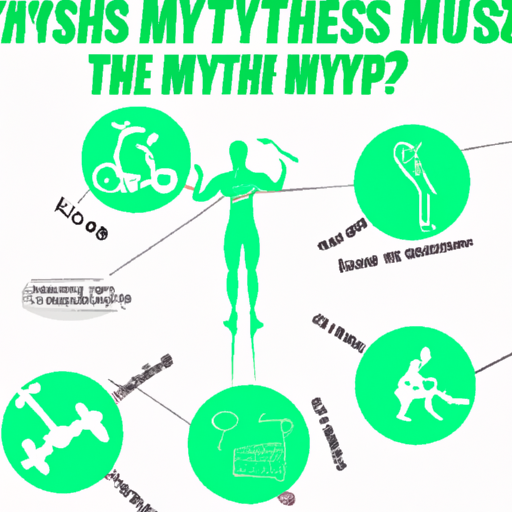The Seven Most Common Fitness Myths
Debunking the Seven Common Fitness Myths
With a new year often comes new fitness resolutions. However, the path to achieving these goals can sometimes be hindered by seven common fitness myths that many people believe. In this article, we aim to debunk these misconceptions and provide you with the truth to help you reach your fitness goals.
Myth 1: “I need to spend at least one hour in the gym to see results.”
One of the most common fitness myths is that you need to spend hours in the gym to see results. This is absolutely not the case. Research has shown that you can actually achieve better results with just 15 minutes of interval training three times a week. It’s not about how long you exercise, but how effectively you use your workout time. So, forget those marathon gym sessions and focus on quality, not quantity.
Myth 2: “I’m exercising, so I can eat whatever I want.”
Think you can eat whatever you want because you’re working out? Think again. This is another common fitness myth that can sabotage your weight loss goals. Even if you’re burning calories through exercise, you still need to pay attention to your diet. If you want to lose weight, you’ll need to consume fewer calories than you burn. So, while a post-workout treat is okay once in a while, don’t make it a daily habit.
Myth 3: “If I eat organic or gluten-free, I’ll lose weight.”
While eating organic or gluten-free foods can have many health benefits, it’s not a guaranteed ticket to weight loss. This is another fitness myth that needs debunking. Regardless of how ‘healthy’ the food is, you can still overeat and consume more calories than you burn. It’s always important to evaluate your overall caloric intake and not rely solely on the type of food you’re eating.
Myth 4: “Fitness shakes are only for bulking up.”
This is a common fitness myth that can discourage people from using fitness shakes as part of their diet. The truth is, fitness shakes can be an excellent way to maintain a healthy diet and help you reach your individual fitness goals, whether that’s weight loss or muscle gain. They’re not just for bodybuilders looking to bulk up. They can provide essential nutrients and protein that can aid in recovery and muscle growth, making them a beneficial addition to any fitness diet.
Frequently Asked Questions
Are there benefits to working out every day?
Working out every day can have benefits, but it’s essential to listen to your body and allow for adequate rest and recovery. Overtraining can lead to injuries and hinder your progress.
Is it better to workout in the morning or evening?
Whether you workout in the morning or evening depends on personal preference. Some people find they have more energy in the morning, while others prefer to exercise after work. The important thing is to find a routine that works for you and stick to it.
Do I need to go on a strict diet to lose weight?
While diet plays a significant role in weight loss, it doesn’t mean you need to go on a strict diet. It’s more about making healthy choices and consuming fewer calories than you burn. A balanced diet combined with regular exercise is often the most effective way to lose weight.
To conclude, it’s important to be aware of these seven common fitness myths to make informed decisions about your health and fitness journey. Remember, it’s not about quick fixes or following the latest trends, but about finding a balanced and sustainable approach that works for you.
| Fitness Myths | Truth |
| — | — |
| “I need to spend at least one hour in the gym to see results.” | Research shows you can actually achieve better results doing 15 minutes of interval training three times a week. |
| “I’m exercising, so I can eat whatever I want.” | Diet is still important, so if you want to lose weight, you’ll need to eat fewer calories than you burn in your daily workout routine. |
| “If I eat organic or gluten-free, I’ll lose weight.” | While there are many benefits, as with any diet plan, make sure to evaluate your overall caloric intake – you can still over eat. |
| “Fitness shakes are only for bulking up.” | Fitness shakes are actually a great way to maintain the healthy diet necessary to reach individual fitness goals whether that is weight loss or muscle gain. |

Debunking the Seven Common Fitness Myths: A Deeper Dive
Embarking on a fitness journey is exciting, but can be riddled with misinformation. We previously debunked seven common fitness myths, but let’s delve deeper into these misconceptions, to help you avoid pitfalls and stay on track towards your fitness goals.
Myth 1: “I need to spend at least one hour in the gym to see results.”
Quantity does not necessarily equate to quality when it comes to workouts. The idea that you need to spend countless hours in the gym is a pervasive but misguided notion. In fact, short, high-intensity interval training (HIIT) workouts can be more effective than longer, less intense sessions. These workouts can boost your metabolism, improve cardiovascular health and lead to faster weight loss. Remember, it’s all about efficiency and intensity, not just the duration of your workout.
Myth 2: “I’m exercising, so I can eat whatever I want.”
Exercise and nutrition go hand in hand – you can’t have one without the other. Believing that you can eat anything because you’re exercising is a dangerous myth that can hinder your progress. Yes, physical activity helps burn calories, but it doesn’t give you a free pass to indulge in unhealthy food. Balancing your caloric intake with the calories burned during exercise is crucial. So, think twice before reaching for that extra slice of pizza post-workout.
Myth 3: “If I eat organic or gluten-free, I’ll lose weight.”
While organic and gluten-free foods can be healthier options, they don’t automatically lead to weight loss. Eating ‘healthy’ foods doesn’t mean you can ignore portion sizes. Overeating, even with healthier options, can still lead to weight gain. Caloric balance is key for weight loss, regardless of the type of food you consume. So, enjoy your organic and gluten-free foods, but remember to watch your portions.
Myth 4: “Fitness shakes are only for bulking up.”
Fitness shakes are not exclusive to bodybuilders or those looking to bulk up. They can be a convenient and effective way to get essential nutrients, especially for those with a busy lifestyle. Depending on their composition, fitness shakes can aid in weight loss, muscle recovery, and overall nutrition. So, don’t shy away from these handy supplements, they can be tailored to fit any fitness goal.
Myth 5: “Spot reduction is possible.”
Spot reduction, or the idea that you can lose fat from a specific area of the body by exercising that area, is a myth that has been debunked by numerous studies. When you exercise, you burn calories and lose fat throughout your body, not just in one area. So, while you can strengthen specific muscles with targeted exercises, you can’t choose where you lose fat.
Myth 6: “No pain, no gain.”
The belief that pain is indicative of an effective workout is not only a myth but can also be dangerous. While a certain level of discomfort is normal, especially when trying a new exercise or increasing intensity, pain is a warning sign from your body that something is wrong. Pushing through the pain can result in serious injuries. Remember, safety first.
Myth 7: “I can’t workout because I’m too old.”
Age is just a number when it comes to fitness. While you may need to adapt your workouts as you age, there’s no age limit to staying active. Regular exercise can help improve balance, flexibility, and cardiovascular health, and can also reduce the risk of chronic diseases. So, it’s never too late to start on your fitness journey.
Frequently Asked Questions
Does more sweat mean a better workout?
Sweating more doesn’t necessarily mean you’re working out harder. Sweat is your body’s way of cooling down and can be influenced by various factors including the temperature, your fitness level, and even genetics.
Are free weights better than machines?
Both free weights and machines can be effective depending on your fitness goals. Free weights are great for working multiple muscle groups at once, while machines can help target specific muscles and are often safer for beginners.
These deeper insights into the seven common fitness myths should provide a clearer path towards your fitness goals. Remember, every journey is unique, so what works for others might not work for you. Listen to your body, stay informed, and most importantly, enjoy the process.
Frequently Asked Questions
Can I gain muscle just by lifting weights?
While lifting weights is a critical component of building muscle, it’s only part of the equation. Proper nutrition and rest are also essential for muscle growth. It’s crucial to consume enough protein and calories to fuel your workouts and recovery.
Does cardio make you lose muscle mass?
Excessive cardio can lead to muscle loss if you’re not consuming enough calories or protein to support your workouts. However, a balanced exercise routine that includes both cardio and strength training can help you maintain and even build muscle mass while also improving cardiovascular health.
Can I target fat loss in specific areas of my body?
This is another common fitness myth. While you can strengthen and tone specific muscles, you can’t target fat loss in specific areas of your body. When you lose fat, it occurs throughout your entire body. The distribution of fat loss varies from person to person and is largely determined by genetics.
Do I need supplements to achieve my fitness goals?
While supplements can assist in reaching fitness goals, they are not necessary for everyone. A well-balanced diet can typically provide all the nutrients your body needs. However, in some cases, like intense training programs or specific dietary restrictions, supplements can be beneficial. Always consult with a healthcare provider or a nutritionist before starting any supplement regimen.
Common Fitness Myths Table
| Myth | Reality |
|---|---|
| Need to spend at least one hour in the gym to see results | Quality of workout matters more than the duration |
| Can eat anything if exercising regularly | Diet is crucial, even when exercising |
| Eating organic or gluten-free guarantees weight loss | Calorie intake matters more than the type of food |
| Fitness shakes are only for bulking up | Fitness shakes can aid in various fitness goals, not just bulking up |

